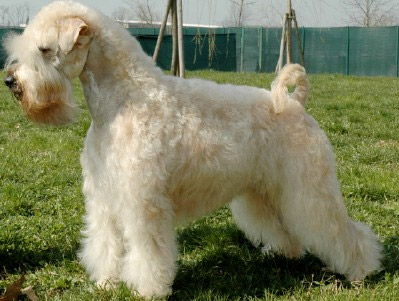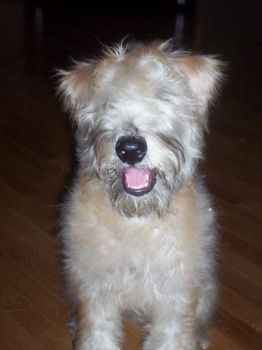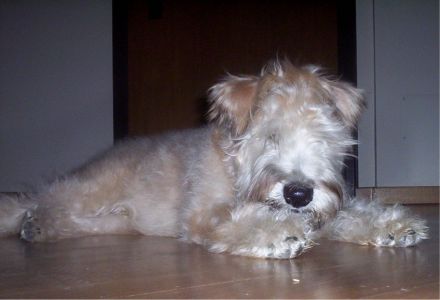IRISH SOFT COATED WHEATEN TERRIER

In photo JIVARA - Multicampionessa of the
amatoriale breeding Onethousand Crazy Coat.
FCI Standard N° 40 / 25. 04. 2001 / GB
ORIGIN : Ireland.
DATE OF PUBLICATION OF THE ORIGINAL VALID STANDARD : 27.01.2001.
UTILIZATION : Wheaten Terriers were always used by small farmers to kill vermin or help with the work about the farm. They were used for a long time in the difficult job of hunting badgers and otters.
CLASSIFICATION FCI : Group 3 Terriers.
Section 1 Large and medium sized Terriers.
Without working trial.
BRIEF HISTORICAL SUMMARY : The history of the Irish Soft Coated Wheaten Terrier has been somewhat obscured by its closeness to the other Irish Terrier breeds. The Wheaten is probably the oldest of the four breeds. Its existence for at least 200 years can be inferred from textual references to "soft‑coated" dogs. The relation of the modern Irish Terrier to the Wheaten, though less well documented, appears to have been the result of deliberate breeding experiments. So the humble Wheaten probably has a fairly mixed ancestry. Despite the long history of the Wheaten, it wasn't until 1937, that the Soft Coated Wheaten was officially recognised by the Irish Kennel Club. The breed has grown steadily in popularity since and is now well known world-wide.
GENERAL APPEARANCE : A hardy, active, short coupled dog, well built, giving the idea of strength. Not too leggy nor too low to the ground.
BEHAVIOUR / TEMPERAMENT : Spirited and game. Good tempered. Most affectionate and loyal to his owners. Most intelligent. A trusty, faithful friend, defensive without aggression.
HEAD : In general powerful without being coarse. Long, in good proportion to the body. Hair same colour as on body.
CRANIAL REGION :
Skull : Flat and clean between ears, not too wide.
Stop : Defined.
SUGGESTED BREEDINGS by MENANDPETS.COM:
No breeding to signal
if you want to know like signaling yours,
contacts: marketing@inseparabile.it
FACIAL REGION :
Nose : Black and well developed.
Muzzle : Foreface not longer than skull.
Jaws : Jaws strong and punishing
Teeth : Teeth large, regular; scissor or level bite (i.e.edge to edge) neither undershot nor overshot.
Cheeks : Bones not prominent.
Eyes : Dark, dark hazel, not too large, not prominent, well placed.
Ears : Small to medium, carried in front, level with skull. Dark shading on base of ear allowed and not uncommon, accompanied by a light wheaten coloured overlay. This is the only area of the dog where under-coat is allowed. "Rose" or "flying" ears are objectionable.
NECK : Moderately long and strong but not throaty.
BODY : Not too long. Length from withers to base of tail approximately the same as from ground to withers.
Back : Strong and level with even top line.
Loins : Short, powerful.
Chest : Deep, ribs well sprung.
TAIL : Well set, not too thick. Carried gaily but never over the back. The tail is docked so that two thirds of its original length remains assuming it is in proportion to the dog. An undocked tail is permitted.
LIMBS
FOREQUARTERS :
Shoulders : Fine, well laid back, muscular.
Forelegs : Perfectly straight viewed from any angle. Good bone and muscle.
HINDQUARTERS : Well developed with powerful muscle.
Thighs : Strong and muscular.
Stifles : Bent.
Hocks : Well let down, turned neither in nor out. Hind dewclaws should be removed.
FEET : Small, not spreading. Toenails preferably black but varying dark colours allowed.
GAIT / MOVEMENT : Straight action fore and aft, going and coming. Elbows tucked in. Side view : free, light co‑ordinated movement.
COAT
HAIR : A single coated dog. Texture soft and silky to feel and not harsh. Young dogs excluded from this. Trimming permitted.
Trimmed dogs : Coat cut close at neck, chest and skull, and left especially long over eyes and under jaw. Whiskers encouraged. Profuse feathering on legs. Body coat trimmed to follow the outline of the dog but not sculpted. Tail trimmed close and neatly tapered.
Untrimmed dogs : The coat at its longest not to exceed five inches (12,7 cm). Soft, wavy or loosely curled with the sheen of silk. Under no circumstances should the coat be "fluffed out" like a Poodle or an Old English Sheepdog. Dogs shown in this condition should be heavily penalised as they give a wrong impression of type and breed. Special attention is drawn to puppy coat development. Pups are seldom born with the correct coat of maturity, care must be taken when assessing this point. They go through several changes of colour and texture before developing the mature adult coat. This usually occurs between 18 months and 2½ years.
Pups : Are seldom born with the correct colour or texture coat. They come reddish, greyish and sometimes clear wheaten. The masks are generally black. Sometimes there is a black streak down the centre back or black tips to the body coat. These dark markings clear away with growth.
COLOUR : A good clear wheaten of shades from light wheaten to a golden reddish hue.
SIZE AND WEIGHT :
Height at the withers : Dogs 18‑19 inches (46‑48 cm).
Bitches somewhat less.
Weight : Dogs 40‑45 lbs (18‑ 20, 5 kg).
Bitches somewhat less.
FAULTS : Any departure from the foregoing points should be considered a fault and the seriousness with which the fault should be regarded should be in exact proportion to its degree.
- Nervousness. Viciousness.
- Nose any colour other than black.
- Undershot mouth. Overshot mouth.
- Overall mature coat not clear wheaten colour.
ELIMINATING FAULTS :
- Aggresive or overly shy.
- Yellow eyes.
- Dull, thick, woolly or cottony textured hair.
- White coat. Brown coat.
Dogs carrying any of the above eliminating faults should never be bred from.
Any dog clearly showing physical or behavioural abnormalities shall be disqualified.
NOTE : Male animals should have two apparently normal testicles fully descended into the scrotum.
Automatic translate from inseparabile.comORIGIN: Great Britain
HISTORY:
And a dog the much
ancient whose history laughed them to devout of two thousand years
ago, sure with origins in common with the fox terrier to the which
somiglia very many one.
The first image that the ritrae appeared
in a picture of the 700
.
in
the photos Argon of Gianluigi L.
DESCRIPTION:
strongly and very constructed in a contained
volume. It does not have to never seem massive or ordinary. The
construction must evidence a perfect equilibrium, in particular for
how much it concerns the relationships between skull and snout,
Height and length of the body from the tip of the
shoulder to the buttock. Such measures must be pressoch equal. The
dog dovr to place itself like a horse from hunting from the short
back, in a position to covering much land. .
The height around to i 46 cm to the garrese for an
optimal weight of 12,3 kilograms.
It has a flat, streamlined and long skull. Its
orecchie are folded and have shape of one V. Its tail normally comes
cut to of its length. This race has many "crews of attack" to
disposition: a strong jaw, of the teeth very develops to you, the
physical force and above all the courage.
And a dog very
proporzionato and physically elegant: moreover force concentrating.
Its eyes of dark color, full
loads of fire, and intelligence, not prominenti. Of possible shape
devout the round one. They do not have to be n too much distant
between they, n it too much places you up on the skull or too much
near the orecchie. The eye clearly much criticabile
The hair dense, of webbing
much rough one, varies from 1,8 cm. (3/4 inc.) on the shoulders to
3,7 cm. (1 1/2 inc.) on the garrese, on the back, the cost one and
devout thighs with a sottopelo and short soft. The devout back and
the posterior one have a rough hair of the flanks. On the jaws the
hair must be crespo and of sufficient length for giving a force
appearance to the snout. The hair on the limbs dense and crespo.
The colors are: Red grain, red ignited and
red yellowish
I USE:
Like all the terrier
selected for the hunting in lair of the selvati to us rates, but
also donnole, above all martore and you make some; it was employed
also like retriever in water and today portalettere during the war
obtaining also a medal in 1918 that it always recited "distinguished
for tenacity and sprezzo of the danger" a lot appreciated like dog
from company.
TEMPERAMENT And CHARACTER
:
to the erta, express in the
movements, with penetrating expression; incessantly careful.

HEALTH:
Resistant dog to the
diseases, fears the cold.
MAINTENANCE:
It goes fed in
complete way but without to exaggerate in order not to make to
fatten it.
It must at least be held in house of night and the
cold periods.
One what
that plays to its advantage that with the exception of many terrier
the soft does not need of the stripping.